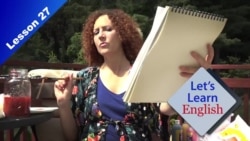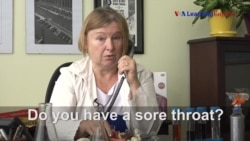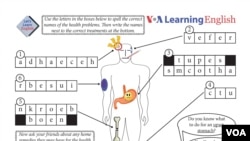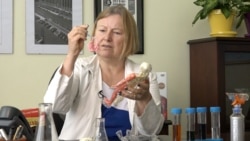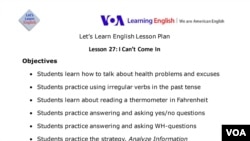Let's Learn English (Tiếng Anh cơ bản) là một khóa học tiếng Anh mới. Các giáo viên dạy tiếng Anh-Mỹ đã soạn thảo khóa học này cho những người mới bắt đầu. Khóa học sẽ kéo dài trong 52 tuần.
Mỗi tuần sẽ có một bài học mới bằng video cho thấy cuộc sống của giới trẻ Mỹ. Bài học giúp trau dồi kỹ năng nói, viết và từ vựng.
Ngoài ra cũng sẽ có các bài thực hành có thể in ra, bảng đánh giá và kế hoạch học tập cho cá nhân và giáo viên dạy tiếng Anh. Chúng tôi khuyến khích các bạn theo dõi các bài học hàng tuần và chia sẻ sự tiến bộ của bạn với chúng tôi qua phần ý kiến và email.
Tóm lược (Summary)
Anna does not feel well. She calls her boss and her doctor. What do they tell her to do? And will she follow their advice?
Anna cảm thấy không khỏe. Cô ấy gọi cho sếp và bác sĩ của mình. Họ nói cô phải làm gì? Và cô có nghe theo lời khuyên của họ không?
Nói (Speaking)
Learn to pronounce the new words for this lesson. You also learn about irregular past tense verbs.
Cách phát âm (Pronunciation)
Use this video to learn about how to ask two kinds of questions: WH-questions and Yes/No questions.
Phần đối thoại (Conversation)
Anna: Hello! I am sure that today, in Washington, D.C,. there are a lot of great things to do. But I am not doing any of them. I am sick. Right now, I'm going to call my boss and tell her I cannot come in to work.
Caty: Hello?
Anna: Ms. Weaver, Hi. I can’t come to work today.
Caty: Why not? What is wrong?
Anna: Well, yesterday I felt fine.
Anna: In the morning, I painted for hours. In the afternoon, I cut wood. Then, I built a fire.
Caty: Anna, what do you mean? Why can’t you come to work today?
Anna: I do not feel well. I think I’m sick.
Caty: I’m sorry to hear that. I was sick last week, too. I had the flu.
Anna: (sneezes) What did you do?
Caty: I slept a lot and I drank a lot of water. Do you have a doctor?
Anna: Yes, I do.
Caty: You should call your doctor. And get lots of rest!
Anna: Thanks, Ms. Weaver. I’ll call right now. I'm calling my doctor.
Dr. Bennett: (to herself) Now, where does this thing go?
Dr. Bennett: Hello. This is Dr. Bennett. How can I help you?
Anna: Hello, Dr. Bennett. This is Anna.
Dr. Bennett: Oh, Hi, Anna. How can I help you?
Anna: I think I’m sick.
Dr. Bennett: Let me ask you a couple of questions. Do you have a sore throat?
Anna: Yes. I have a sore throat.
Dr. Bennett: Do you have a cough?
Anna: Yes. I have a cough.
Dr. Bennett: When did you start feeling sick?
Anna: This morning. Yesterday I felt great. In the morning I painted, for hours - in the afternoon I cut wood -
Dr. Bennett: Excuse me, Anna. But I don’t need to know all that. Do you have a fever?
Anna: Oh. My thermometer says 125 degrees?! What??
Dr. Bennett: Yeah, that’s not right.
Anna: Oh. Wait. The thermometer was in my hot cup of coffee.
Dr. Bennett: Please take it again, Anna.
Anna: Okay, the thermometer says 100.5 degrees.
Dr. Bennett: 100.5 degrees is not too high. I want you to drink lots of water. Rest in bed and get lots of sleep.
Anna: That is what my boss said to do. Um, Dr. Bennett, when can I go to work?
Dr. Bennett: Don’t go to work for a couple of days.
Anna: Yes! I mean, I don’t want to make my co-workers sick.
Dr. Bennett: That’s right. Call me back in a couple of days.
Anna: I will, Dr. Bennett. And thanks.
Anna: Well, you heard the doctor – no work for a couple of days. I need water, sleep and um … lots of movies! Well, the doctor didn’t say anything about movies. But it can’t hurt! Until next time!
Viết (Writing)
What happens when you get the flu? Does your family have a special way to get well again? Write to us by email or in the Comments section. Click on the image below to download the Activity Sheet and practice talking about health problems with a friend.
Sách lược học tập (Learning Strategy)
Learning Strategies are the thoughts and actions that help make learning easier or more effective.
The learning strategy for this lesson is Analyze Information. When we are learning a second language, we can think carefully about the new information we learn, and make a decision. That is what analyzing information means.
In the video, Dr. Bennett asks Anna many questions. Then she analyzes the information she learned. She tells Anna to stay home, drink water and sleep.
Can you find another time in the video when someone analyzes information? Write to tell us about it in an email or in the Comments section. Teachers, see the Lesson Plan for more on how to teach this strategy.
Bài kiểm tra (Quiz)
Listen to short videos and test your listening skills with this quiz.
Quiz - Lesson 27
Start the Quiz to find out
______________________________________________________________
Từ ngữ mới (New Words)
cough - n. the act of forcing air through your throat with a short, loud noise often because you are sick
doctor - n. a person who is skilled in the science of medicine
fever - n. a body temperature that is higher than normal
fire - n. the light and heat and especially the flame produced by burning
flu - n. a common disease that is caused by a virus and that causes fever, weakness, body aches, and breathing problems; also called influenza
rest -v. to stop doing work or an activity
sick - adj. affected with a disease or illness; ill
sneeze - v. to suddenly force air out through your nose and mouth with a usually loud noise because your body is reacting to dust or a sickness
sore - feeling or affected by pain
thermometer - n. an instrument used for measuring temperature
throat - n. the tube inside the neck that leads to the stomach and lungs
wood - n. the hard substance that makes up the stems and branches of trees and shrubs
Past Tense Verbs
cut / cut - v. to use a sharp tool (such as a knife) to open or divide (something, such as paper or wood)
do / did - v. to perform an action or activity
drink / drank - v. to take a liquid into your mouth and swallow it
feel / felt - v. used to describe someone's physical or mental state
hear / heard - v. to be aware of (sound) through the ear
hurt / hurt - v. to be a source or cause of pain
paint / painted - v. to cover (something) with paint or to put paint on (something)
say / said - v. to use your voice to express (something) with words
sleep / slept- v. to rest your mind and body by closing your eyes and becoming unconscious
______________________________________________________________
Tài liệu miễn phí (Free Materials)
Download the VOA Learning English Word Book for a dictionary of the words we use on this website.
Each Let's Learn English lesson has an Activity Sheet for extra practice on your own or in the classroom. In this lesson, you can use it to practice talking about health problems.
Phần dành cho giáo viên (For Teachers)
See the Lesson Plan for this lesson for ideas and more teaching resources. Send us an email if you have comments on this course or questions.
Grammar focus: Irregular past tense verbs
Topics: Asking about health problems; giving advice for health problems
Learning Strategy: Analyze Information
Speaking & Pronunciation Focus: Wh-questions and Yes/No question intonation; Groups of verbs with irregular past tense forms
______________________________________________________________
Now it's your turn. Send us an email or write to us in the Comments section below or on our Facebook page to let us know what you think of this lesson.




